- Home
- Raymond Benson
High Time To Kill Page 7
High Time To Kill Read online
Page 7
After a moment’s silence. Bond raised his hand. Marquis raised his eyebrows when he saw who it was. “Yes, uhm, Mr. Bond?”
“Have there been any communications at all claiming responsibility for this act?”
“No, not vet.”
“In your opinion, do you think it’s the work of a foreign power?”
“At this point, I’m not ruling out anything. MI5 is handling the investigation. However, as you will see in your briefing packet, there is a copy of a fax that was received at the DERA Fleet facility exactly nine and half months ago. Dr. Wood had shown it to me, thinking it was some kind of prank. I kept the note since the fax number at the facility had always been classified. Can we show that slide, please?”
The slide on the wall changed again to reveal a blurry copy of a faxed piece of paper. There was no mistaking the wording, however.
GOOD LUCK WITH THE SKIN PROJECT. WE ARE VERY INTERESTED IN YOUR PROGRESS.
THE UNION
Bond felt a chill slither down his spine.
Marquis continued. “I don’t know a lot about this Union, but I was briefed this morning on the group’s recent activities. It sounds to me like the kind of job they would pull off. Any other questions?”
When there were none, M stood up. “Thank you, Group Captain. We’ll start the debriefing with you and the rest of Dr. Woods team after lunch.”
Bond stepped into M’s office to find her alone with Bill Tanner.
“Come in, Double-O Seven,” she said. “Sit down.”
He sat across from the woman whom he had grown to admire more and more during the past two years. There had been a considerable amount of friction between them when she first took over MI6, but now they had mutual respect. Bond had especially proved his value to her during her personal crisis during the Decada affair a year earlier.
“I understand you and the Chief of Staff played golf with Group Captain Marquis and Dr. Harding yesterday,” she said.
“Yes, ma’am.”
“I want to hear what you think.”
Bond shrugged. “I’m just as puzzled as anyone. I agree with Marquis’s assessment of Harding—that he really didn’t seem the type to do something like this. My suspicions would be directed more toward Marquis.”
M’s eyebrows rose. “Really? Why?”
“Because he’s an arrogant son of a bitch.”
Bond’s outspokenness didn’t faze her. “I know all about your history together,” she said. “Please don’t carry schoolboy prejudices into this, Double-O Seven.”
“Nevertheless, ma’am,” Bond said, “I don’t think too highly of him.”
“Group Captain Marquis is a distinguished officer and a national hero of sorts. You’re aware of his mountaineering achievements?”
“Yes, ma’am. You’re absolutely right, I’m allowing my personal feelings about the man to influence my opinion of him. And my opinion is that he is an ass.”
“Your opinion is noted,”Msaid, “but I’mafraid you’ll needmore than professional jealousy as evidence of Group Captain Marquis’s guilt.”
That stung.
She nodded to Tanner. He handed an eight-by-ten glossy black-and-white photograph to Bond. It was taken by a security camera and revealed a fuzzy shot of Steven Harding in a line of people. He was carrying an attaché case and a travel bag.
“We just got this,” Tanner said. “It was taken last night around tenthirty by one of the customs security cameras at Waterloo Station—at the Eurostar terminal. Dr. Steven Harding boarded the last train to Brussels.”
“Why Belgium?” Bond asked.
“Who knows? We’ve contacted Station B to see if we can have his movements traced. MI5 have turned the investigation over to us. We believe that Skin 17 is no longer in the UK.”
M spoke up. “Double-O Seven, I want you to go to Brussels and rendezvous with Station B. Your job is to track down Dr. Harding. If he has Skin 17, you’re to do everything in your power to get it back. The Minister of Defence is obsessed with this Mach 7 business and with Great Britain being the first to achieve this goal. He’s told me in no uncertain terms that the formula must be recovered. I’m afraid I agree with him that it would be disastrous should Skin 17 get into the hands of a country like, say, Iraq or Iran … or Red China. I wouldn’t want the Russian Mafia to get hold of it. I wouldn’t want Japan to have it. Double-O Seven, it’s also a matter of principle. We developed it. Here in Britain. Dr. Wood was a brilliant British physicist. We want the credit for developing the process. Do I make myself clear?”
“Yes, ma’am.”
“Good luck, then.”
Bond stopped by his office to gather his things, then paused by Helena Marksbury’s desk.
“I, uhm, have to go to Brussels,” he said.
Helena was typing furiously and didn’t stop to look at him. “I know. You’re to pick up the Jaguar from Q Branch before you leave today. I’m making arrangements for you to use the channel tunnel so you can drive across. I thought you’d prefer that.”
“Thank you.”
“Station B is handling your hotel. The contact’s name is Gina Hollander. She’ll meet you at the Manneken-Pis at fourteen hundred hours tomorrow.”
“All right.”
“Good luck.”
Bond placed his hand over hers to stop her typing. “Helena …”
“Please, James,” she said softly. “Just go. I’ll be fine. When you get back, everything will be … as before.”
Bond removed his hand and nodded. Without saying another word, he turned and walked toward the elevator.
FIVE
THE GOLDEN
PACEMAKER
APPROXIMATELY TWELVE HOURS BEFORE JAMES BOND RECEIVED HIS assignment to track Dr. Steven Harding to Belgium, the physicist arrived at the Midi station in Brussels and took a taxi to the Métropole, the only nineteenth-century hotel in the famed city. Located in the heart of Brussels in the Place de Brouckère, the historical center, the Hotel Métropole is more like a palace than a hotel. French architect Alban Chambon brought a mixture of styles to the interior by infusing it with an air of luxury and richness of materials—paneling, polished teak, Numidian marble, gilded bronze, and forged iron.
Most visitors find the French Renaissance main entrance and the Empire-style reception hall breathtaking, but Harding wasn’t interested in the historical or aesthetic qualities of the hotel. He was tired and frightened, and he wanted to get Phase Two out of the way as soon as possible so that he could collect his money and flee to some island in the South Pacific.
“Oui, monsieur?” the receptionist asked.
Harding stammered, “Uhm, sorry, I only speak English.”
The receptionist, used to foreign visitors, smoothly switched languages. “What can I do for you, sir?”
“I have a reservation. Peters. Donald Peters.”
The young woman looked it up on the computer. “Yes, Mr. Peters. Your room has been paid for. How many nights will you be staying?”
“I’m not sure. Possibly three?”
“That’s fine, just let us know. Do you have bags?”
“Just what I’m carrying.”
He wrote false information on the registration card, then took the key.
“You’re in the Sarah Bernhardt Room, Number 1919 on the third floor.”
“Thank you,” Harding said. He took the key and carried his luggage to the elevator, waving away the porter. The elevator was an oldfashioned cagelike contraption with impressive metallic beams rising up through the ceiling.
Sarah Bernhardt’s autograph was engraved on a gold plaque on the door of his room. Apparently the famous actress had once lived in the suite. The hotel was indeed the spot for the rich and famous throughout the last century.
Harding locked the door behind him and breathed a sigh of relief. So far, so good. He hadn’t noticed anyone tailing him. There were no suspicious characters lurking about. Perhaps he was really going to get away with it.
Feeling more confident than he had in weeks, Harding went straight to the minibar in the sitting room, unlocked it, and found a small bottle of vodka. He opened it and drank it straight, out of the bottle. Only then did he begin to appreciate the splendor of the hotel.
The suite was divided into two large rooms. The sitting room was equipped with a large wood desk, the minibar, a television, a glasstop coffee table, green chairs and a sofa, a closet with a full-length mirror, potted plants, and a large window that opened onto a terrace. The walls were yellow with white molding. The bedroom was just as spacious, with a king-sized bed, another glass-top table, chairs with the same green upholstery, a second television, oak dresser and cabinet, and small tables by the bed. Another large window opened to the terrace. The bathroom was in brown tile and contained all the amenities one could ask for. A frosted-glass panel covered half the area above the bathtub for showering.
“This is great!” Harding said aloud, rubbing his hands with glee. He was not accustomed to such luxury. Working for the Union certainly had its perks.
The taxi driver was curious as to why Harding wanted to go to a doctor’s surgery after midnight.
“They closed, they closed,” the driver said in imperfect English.
“He’s expecting me,” Harding insisted. He handed the man one thousand Belgian francs. “Here, I’ll pay you the fare when we get there. And I’ll need you to wait for me.”
The driver shrugged and took the money. The cab took Harding to Avenue Franklin-Roosevelt, located in an elegant area of the city near the Hippodrome. It is full of lush green parks and expensive town homes, but in the dark it looked like anywhere else.
The driver let him out at Dr. Hendrik Lindenbeek’s residence. As in most European countries, doctors in Belgium usually carried on their practice from their homes.
Harding rang the bell, and Lindenbeek answered the door after a few seconds. He was a young Flemish cardiologist.
“Come in,” he said in English. Harding noted that Dr. Lindenbeek’s hand shook as he gestured him inside.
Lindenbeek led him through the patient waiting area, which consisted of wicker furniture in a white room, and into the large examination room. Besides the examining table, there was a large wooden desk, bookshelves, trays with equipment, and an X-ray machine with lead wall partitions.
“Is our patient ready to go?” Harding asked.
Dr. Lindenbeek nodded. “The surgery is scheduled for eight o’clock tomorrow morning. I need to get some sleep so I don’t make any mistakes!” He laughed nervously.
“You had better not make any mistakes. Now, tell me exactly what you’re going to do.”
Dr. Lindenbeek took some stationery from his desk and drew a sketch of a man’s torso. He made a small square on the figure’s upper left breast. “The pacemaker will be inserted here. It’s a routine operation. Takes about three to four hours, maybe less.”
“Does the patient go home the same day?”
“He can, but I prefer him to remain in the hospital overnight. He can go home the following day.”
Harding didn’t like that. He was on a tight schedule.
“What about traveling? Will he be able to fly?”
“Sure,” Lindenbeek said. “He just needs to take it easy for a few days to make sure the skin heals. The pocket of skin where we put the pacemaker might open up. It could get infected. We wouldn’t want that to happen.”
“No, we wouldn’t,” Harding agreed. “But could he handle a long aeroplane flight?”
“I don’t see why not.”
“Good.” Harding took the sketch and opened the attaché case. He dropped it inside, then removed the envelope containing the Skin 17 microdot. “This is it. It’s attached to a piece of film. Whatever you do, don’t lose it. It’ll be your neck. Remember what the Union have on you.”
Lindenbeek swallowed hard. “How can I forget?” He gingerly took the envelope from Harding.
Hospital Erasme, located on Route de Lennik south of Brussels, is one of the most modern and largest facilities in all of Belgium. As it is also a university hospital, Erasme is considered to have the best equipment and technology in the country, as well as the most sophisticated and professional staff.
At exactly 7:55 A.M., a few hours before Bond would attend the Skin 17 emergency briefing, Dr. Lindenbeek walked into surgery on the second floor wearing greens, mask, and a cap. He scrubbed his hands and allowed a nurse to fit rubber gloves over them. The patient, a fifty-eight-year-old Chinese man named Lee Ming, was already on the table and was groggy from the drugs he had been given. Preparing the patient for surgery had taken nearly an hour.
A local anesthetic was applied to Lee’s left side, under the collarbone. Lindenbeek examined his equipment while he waited for the drugs to work. The pacemaker was a top-line “demand” model made by Sulzer Intermedics Inc., which meant that the device sensed the heart’s activity and stimulated it only when the natural rate fell below a certain level. Lindenbeek preferred Sulzer Intermedics, an American company, not only because they had a convenient office in Belgium, but because he considered them the best.
“He’s ready, doctor,” the anesthetist said in Flemish.
Dr. Lindenbeek inserted a needle to find the subclavian vein under the left collarbone. After he found it, he made a subcutaneous incision to one side of the needle. He then slid an introducer over the needle, which looked like a big syringe with no plunger. The next step was to insert the pacemaker leads through the introducer down the vein into the heart. Fluoroscopy was used to visualize the lead in the patient.
“I think I’ll need a stylet,” Lindenbeek said. He removed the lead and placed a wire stylet on it so that it would be a little stiffer. This would aid in positioning the lead.
It was a tedious process but one that had to be performed with precision and care. The first lead took nearly an hour to position, and there was still a second one to insert. Ninety minutes into the operation, Lindenbeek was ready to go on to the next step.
The electrical status of the leads was checked to see how much energy was actually needed to pace the heart. Lindenbeek cautiously adjusted the electricity, then took the gold-colored pacemaker from the tray. He attached the leads to the pacemaker, then gave the order to check everything on the EKG.
“Looks good, doctor,” the nurse said.
He nodded, then proceeded to carry on with the final phase of the operation. He carefully made a “pocket” under the incision by blunt dissection between the pectoral muscle and the skin. Once that was done, Lindenbeek inserted the sealed pacer into the pocket and closed the incision.
“Right,” Lindenbeek said. “You’re all finished, Mr. Lee.”
Lee blinked. “I think I fell asleep.”
“You did fine. We’re going to take you to the recovery room now. I’ll see you in a little bit. Try not to move too much.”
Lee was wheeled out of surgery and Lindenbeek removed his gloves and mask. He went to the waiting room, where he found Steven Harding reading a magazine. Harding saw him and stood up.
“Well?” he asked.
“Everything’s fine,” Lindenbeek said. “He can go home tonight if you really want, but I recommend he stay until tomorrow morning.”
Harding considered this and said, “All right. I’d rather be safe than sorry.”He then lowered his voice and asked, “So …where exactly is it?”
Lindenbeek whispered, “The microdot is attached to the battery inside the pacemaker. I had to do it that way in order to seal the pacemaker and sterilize it.”
Harding nodded. “Good. That’s fine, then. Well done.”
“I’m glad you are pleased. Now, will this nightmare finally end?”
Harding smiled, his beady, birdlike eyes sparkling. “I will speak to my superiors this afternoon. I’m sure they will be in touch. Thank you, doctor.”
As Harding left the waiting room, Dr. Lindenbeek stood and watched him. He didn’t like that man. He didn’t like anyone associated
with the so-called Union. At least he had done what they wanted. Now he prayed that he could get on with his life in peace.
Harding took a taxi back to the hotel and indulged himself in a fine lunch at the Métropole café. It consisted of creamed potato soup with smoked eel, salmon in flaky pastry with sevruga caviar, asparagus, and a bottle of Duvel beer. After lunch he went to the Rue d’Aerschot, Brussels’s meager red light district, where he spent several thousand Belgian francs in the company of a plump but serviceable prostitute.
When he got back to his room that evening, the message light on his phone was blinking. He retrieved the message, frowned, and returned the call.
It was not good news.
“Damn,” he muttered to himself. He hung up the phone, then dialed a local contact in Brussels.
“Hello?” he muttered to the Frenchman who answered. “I don’t speak French. Listen, this is Mongoose, right? I’ve just learned that a British secret service agent is driving here tomorrow in a blue Jaguar XK8. He’s on to us. He’ll be on the E19, coming into Brussels, between noon and two o’clock. Is there something you can do about him?”
SIX
THE ROAD TO BRUSSELS
JAMES BOND PICKED UP THE JAGUAR XK8 FROM Q BRANCH AFTER receiving a brief admonition from Major Boothroyd concerning a couple of new features he had added since Bond had used the car last. One of these was a supercharger, an Eaton M112, which normally delivered 370 bhp and 387-pound-foot torque. Bond had insisted on a modification to increase the boost to give 500 bhp, which Boothroyd had reluctantly made.
He took the M20 motorway to the Channel Tunnel Terminal between Dover and Folkestone and boarded Le Shuttle auto-transporter, which, in thirty-five minutes, unloaded cars at Calais. Bond skirted south toward Lille, then got on the E19, the Paris to Brussels autoroute. Recent rains and sunny weather made the landscape rich with green, yellow, and orange brushstrokes. The countryside whipped past Bond as he tested the new supercharger on the open road. It felt great to get away from England and finally make headway on the case.

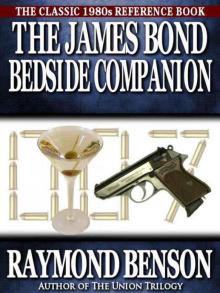 The James Bond Bedside Companion
The James Bond Bedside Companion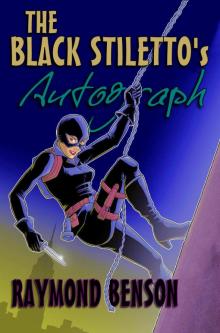 The Black Stiletto's Autograph
The Black Stiletto's Autograph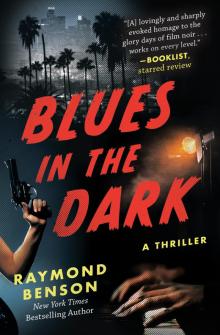 Blues in the Dark
Blues in the Dark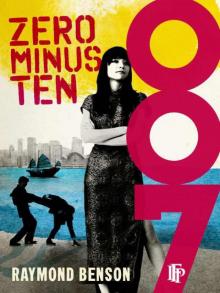 Zero Minus Ten
Zero Minus Ten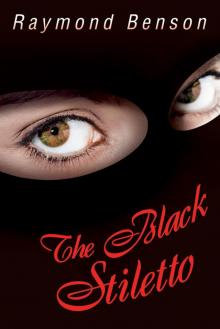 The Black Stiletto
The Black Stiletto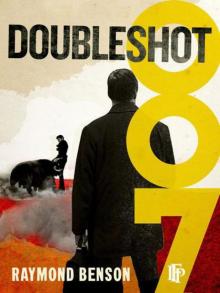 Doubleshot
Doubleshot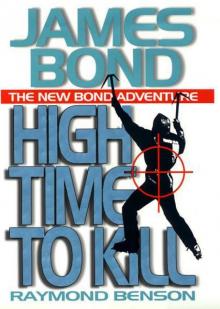 High Time To Kill rbb-3
High Time To Kill rbb-3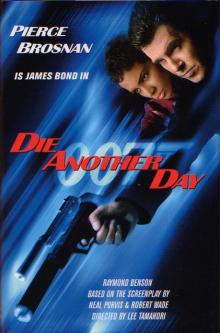 Bond Movies 07 - Die Another Day
Bond Movies 07 - Die Another Day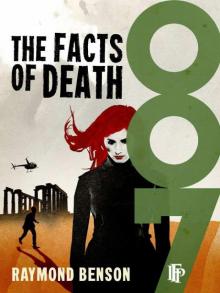 The Facts Of Death
The Facts Of Death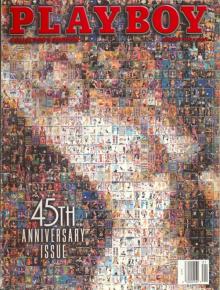 Midsummer Night's Doom
Midsummer Night's Doom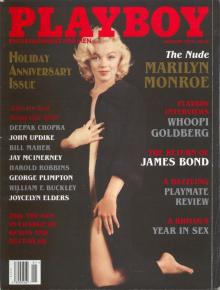 Blast from the Past
Blast from the Past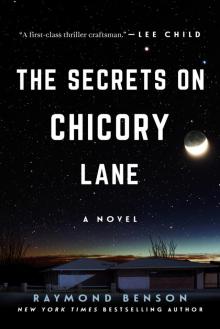 The Secrets on Chicory Lane
The Secrets on Chicory Lane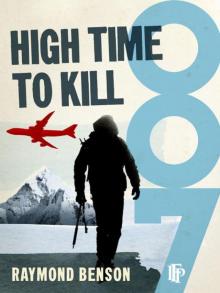 High Time To Kill
High Time To Kill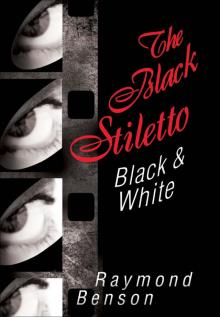 The Black Stiletto: Black & White
The Black Stiletto: Black & White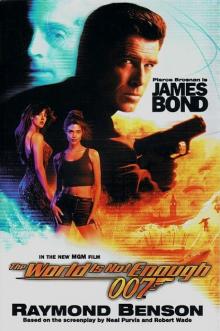 The World Is Not Enough jb-1
The World Is Not Enough jb-1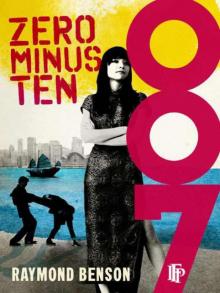 Zero Minus Ten rbb-1
Zero Minus Ten rbb-1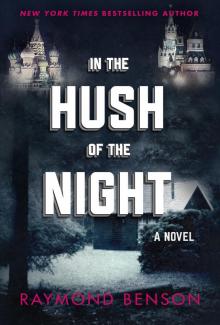 In the Hush of the Night
In the Hush of the Night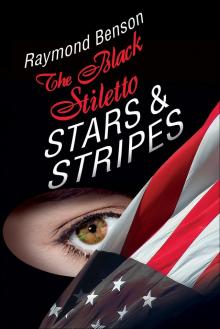 The Black Stiletto: Stars & Stripes
The Black Stiletto: Stars & Stripes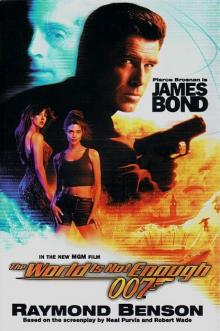 Bond Movies 06 - The World Is Not Enough
Bond Movies 06 - The World Is Not Enough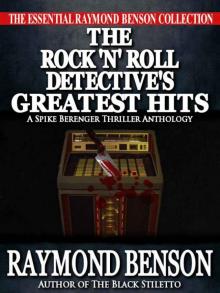 The Rock 'n Roll Detective's Greatest Hits - A Spike Berenger Anthology
The Rock 'n Roll Detective's Greatest Hits - A Spike Berenger Anthology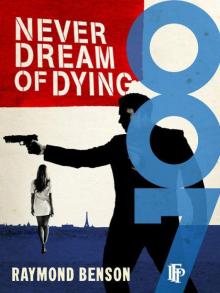 Never Dream Of Dying
Never Dream Of Dying